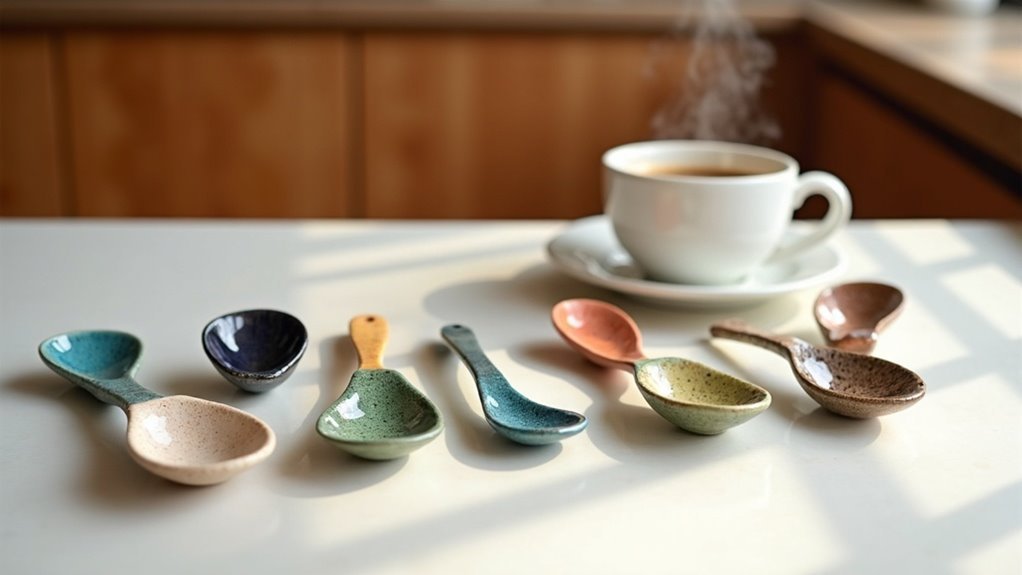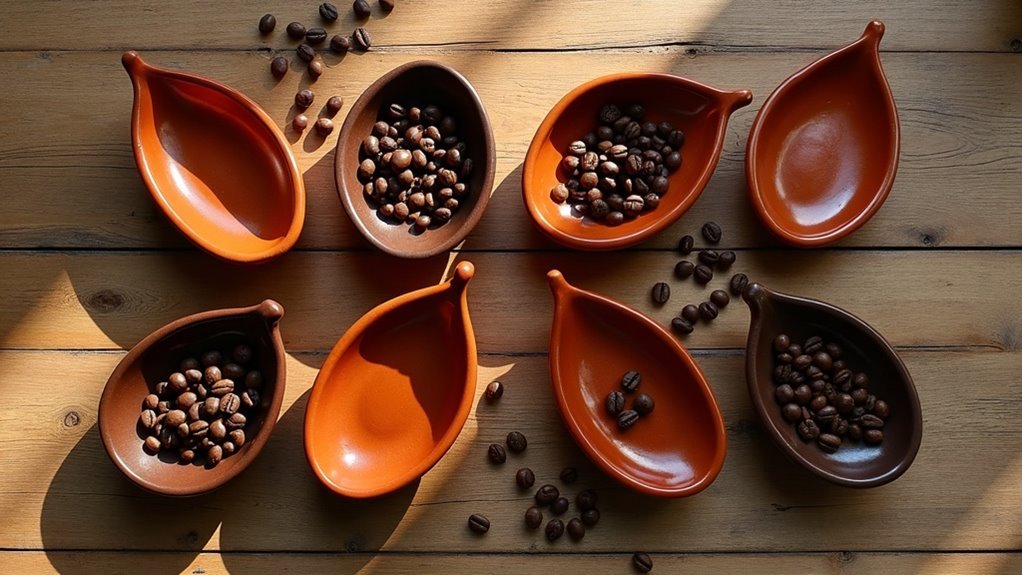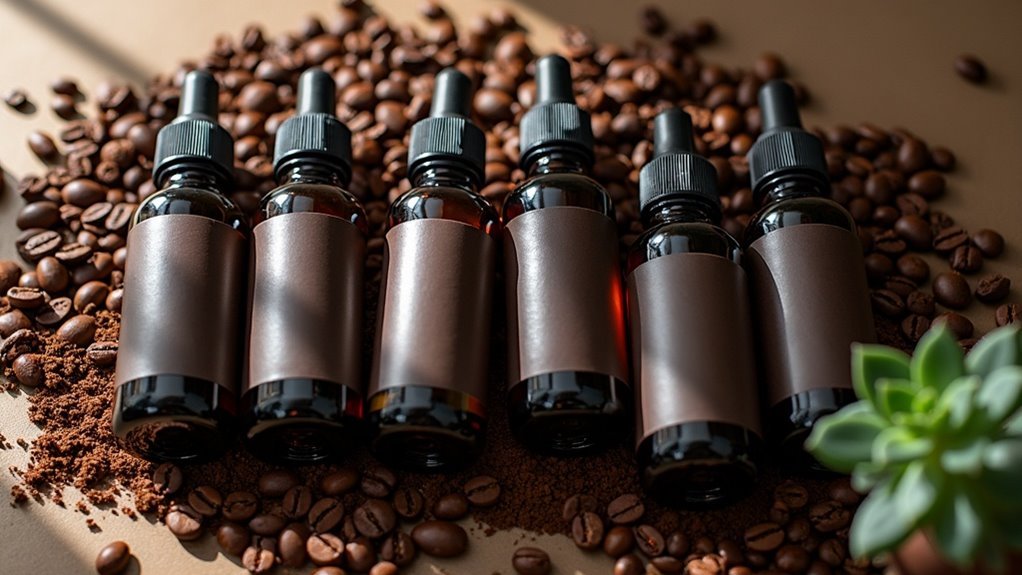Rust-resistant coffee varietals are specially bred to withstand Coffee Leaf Rust (CLR), a disease that can cause significant yield loss and negatively impact coffee quality. Varieties such as Centroamericano and Parainema not only resist this disease but also contribute to enhanced overall production stability and improved farmer income. These resilient varietals play a vital role in sustainable coffee cultivation, especially as climate change and pest pressures continue to escalate. By exploring the latest research, coffee enthusiasts and producers can uncover advancements in the development of these essential coffee varieties, ensuring a resilient future for coffee production.
Key Takeaways
- Rust-resistant coffee varietals are specifically bred to withstand Coffee Leaf Rust (CLR) disease, enhancing the resilience and stability of coffee crops.
- Notable rust-resistant varieties include Catimor, Ruiru 11, Centroamericano, and Parainema, which not only provide disease resistance but also improve yields for coffee farmers.
- The genetic diversity in coffee breeding enables the incorporation of resistance genes, which is crucial for combating the over 55 identified types of CLR.
- High-yielding hybrids such as Timor and Centroamericano achieve exceptional quality scores while maintaining resistance to CLR, offering significant economic benefits to growers.
- Emphasizing rust-resistant varietals is vital for sustainable coffee production, ensuring the long-term viability of coffee farms and adapting to the challenges posed by climate change.
Understanding Coffee Leaf Rust
Coffee leaf rust (CLR) is a significant threat to coffee production worldwide, characterized by rusty orange spots on leaves that hinder photosynthesis. This fungal disease can lead to severe consequences, including total loss of leaves and coffee cherries, resulting in substantial economic damage—over $1 billion in losses in Latin America alone in 2012.
CLR has spread globally and continues to evolve, posing a risk to various Arabica coffee varieties. Research has identified over 55 types of CLR, highlighting the urgent need for developing high-resistance coffee varieties, such as Parainema and Kartika 1, which have shown stability and effectiveness against this persistent threat across diverse environments.
Understanding and addressing CLR is crucial for the future of coffee cultivation.
The Importance of Rust Resistance
Understanding rust resistance is essential for enhancing crop resilience in coffee production.
By prioritizing resistant varieties, you can increase farmer income and guarantee sustainable coffee production amid the ongoing threat of coffee leaf rust.
This strategic focus not only stabilizes yields but also protects the livelihoods of coffee growers worldwide.
Enhancing Crop Resilience
As climate change and disease pressures increasingly threaten coffee yields, selecting rust-resistant coffee varietals has become essential for enhancing crop resilience.
Varietals like Parainema and IPR107 exhibit strong rust resistance, enabling them to withstand coffee leaf rust effectively. These high-yielding varieties can boost coffee production by 20-40%, providing a vital advantage for producers facing ongoing disease challenges.
By incorporating Timor hybrid genetics, these varietals adapt to evolving rust strains, ensuring stable performance across diverse coffee-growing environments.
Understanding and implementing rust-resistant options not only safeguards farmers’ livelihoods but also contributes to sustainable coffee farming amid persistent climate threats.
Increasing Farmer Income
Selecting rust-resistant coffee varietals is crucial for enhancing farmer income by reducing the financial risks associated with crop losses.
Varieties like Centroamericano and Parainema can yield 20-40% more than traditional options, directly boosting potential farmer income.
The devastating 2012 coffee leaf rust outbreak in Latin America, which caused over $1 billion in damage, highlights the importance of these resilient varieties.
By investing in rust-resistant options, farmers not only ensure higher yields but also gain access to the specialty coffee market, where high-quality beans command premium prices.
This strategic shift fosters both immediate financial stability and long-term sustainability in coffee production.
Ensuring Sustainable Production
While the threat of coffee leaf rust (CLR) looms large over coffee production, adopting rust-resistant varietals emerges as a critical strategy for ensuring sustainable coffee farming practices.
By integrating these varieties, you can greatly enhance your resilience against CLR, leading to:
- Increased yields of 20-40% compared to traditional coffee varieties
- Economic stability amidst climate change and agricultural threats to coffee crops
- Access to F1 hybrid coffee varieties like Centroamericano for high yield and rust resistance
- A diverse genetic pool of coffee plants to adapt to evolving disease strains
Implementing rust resistance is essential for sustainable coffee production, safeguarding both your livelihood as a coffee producer and the environment.
Notable Rust-Resistant Coffee Varieties
You’ll find that high-yielding coffee varieties like Catimor and Ruiru 11 not only excel in resistance to coffee leaf rust but also enhance productivity for farmers.
It’s essential to compare these varieties not just for their disease resistance but also for their flavor profiles, as some, like Centroamericano, achieve high scores in specialty coffee competitions.
Understanding these factors will help you make informed decisions about which rust-resistant coffee varieties best meet your agricultural and quality needs.
High-Yielding Varieties
High-yielding rust-resistant coffee varieties are crucial for maintaining coffee production in areas impacted by coffee leaf rust (CLR).
These varieties not only provide strong resistance to CLR but also enhance output, thus improving farmers’ profitability.
Notable varieties include:
- Catimor, recognized for its exceptional yields
- IAPAR 59, which effectively balances disease resistance and quality
- Ruiru 11, a dependable choice across various climates
- Centroamericano, delivering 20-40% higher yields while maintaining excellent quality
Ongoing research continues to unveil promising new varieties such as Parainema and Kartika 1, which are essential for fostering sustainable coffee farming in the face of changing disease challenges.
Disease Resistance Advantages
As coffee leaf rust (CLR) continues to threaten global coffee production, the development of rust-resistant coffee varieties offers critical advantages for farmers.
Varieties such as Catimor and IAPAR 59 are bred specifically to withstand CLR, enhancing disease resistance and crop stability. The Timor hybrid genetic material in these coffee varieties increases resilience against multiple CLR races, providing essential protection.
While no coffee variety is completely immune, Parainema and Kartika 1 demonstrate high resistance and reliable performance across diverse environments.
Flavor Profile Comparisons
Many coffee enthusiasts and producers are increasingly acknowledging the diverse flavor profiles of notable rust-resistant coffee varieties.
These varieties not only offer disease resilience but also present unique tasting experiences across different environments:
- Parainema: Balances acidity with a stable flavor profile, making it a versatile choice for many coffee lovers.
- Centroamericano: Achieves an impressive 90.5 points, showcasing a delightful sweetness and intricate complexity in each cup.
- Catimor: Delivers bold chocolate and nutty notes, catering perfectly to the specialty coffee market.
- Ruiru 11: Features bright acidity complemented by sweet undertones, enhancing its distinctiveness among coffee options.
Understanding these flavor profiles allows you to appreciate the potential of rust-resistant coffee varieties in producing high-quality brews.
The Role of Genetic Diversity
While understanding the complexities of coffee leaf rust (CLR) is essential for effective management, the role of genetic diversity in coffee varietals can’t be overstated.
Genetic diversity allows researchers to incorporate resistance genes from various species into rust-resistant coffee varieties. For instance, the F1 hybrid Centroamericano demonstrates how diverse genetics can yield both disease resistance and high-quality coffee.
With over 55 CLR types identified, breeding programs benefit from diverse genetic options, particularly those featuring Timor hybrid material like Parainema and Kartika 1, which show superior CLR resistance.
Ultimately, tailored genetic diversity is crucial for adapting coffee plants to local environmental conditions and ensuring sustainable coffee production.
Benefits for Coffee Producers
Incorporating rust-resistant coffee varietals can significantly enhance the economic stability of coffee producers.
By adopting these varieties, you’ll benefit from:
- Increased yields of 20-40% compared to traditional types
- Enhanced resilience against coffee leaf rust (CLR) and climate change
- Improved quality, exemplified by Centroamericano’s impressive 90.5 score in the Cup of Excellence
- Greater overall profitability and reduced risk of economic instability due to crop losses
Transitioning to rust-resistant varieties not only mitigates the impacts of CLR but also promotes sustainable farming practices, ensuring long-term viability for coffee growers in a challenging agricultural landscape.
Current Research and Developments
As research progresses, scientists are identifying robust rust-resistant coffee varieties that could redefine the future of coffee production. Remarkably, varieties like Parainema, Kartika 1, and IPR107 show high resistance to coffee leaf rust (CLR) across different environments. A global study by World Coffee Research tested 31 varieties, revealing that while none are immune, some exhibit considerably higher resistance. Cultivars with Timor hybrid genetics outperformed pure Arabica. This research underscores the importance of tailored agricultural strategies that consider local conditions, ensuring sustainable coffee production in the face of challenges.
| Variety | Resistance Level | Genetics |
|---|---|---|
| Parainema | High | Arabica Hybrid |
| Kartika 1 | Moderate | Arabica Hybrid |
| IPR107 | High | Arabica Hybrid |
| Timor Hybrid | Very High | Hybrid |
Future Prospects for Coffee Cultivation
The advancement of rust-resistant coffee varieties heralds a transformative era for coffee cultivation, addressing both yield and quality challenges.
- Enhanced yield through F1 hybrids like Timor
- Stable performance in diverse environments with varieties such as Parainema
- Improved resistance to coffee leaf rust (CLR) threats
- Ongoing research for resilient arabica varieties
As coffee enthusiasts and cultivators look to the future, these innovations promise to secure a sustainable and flavorful coffee supply, ensuring that the rich heritage of coffee continues to thrive.








